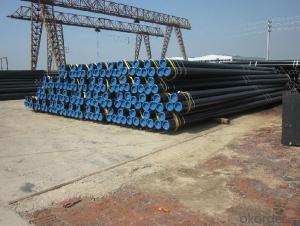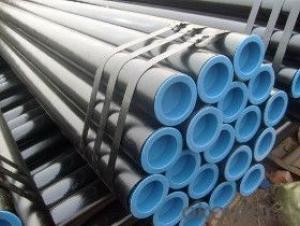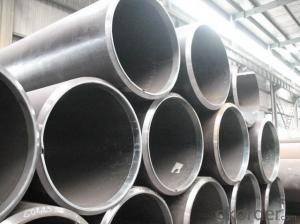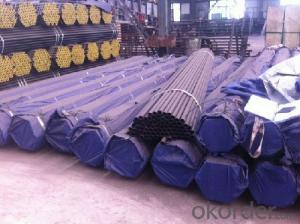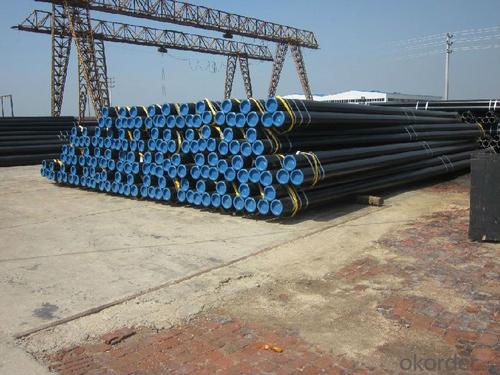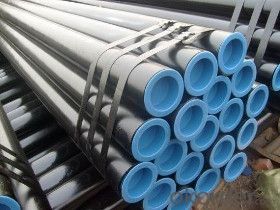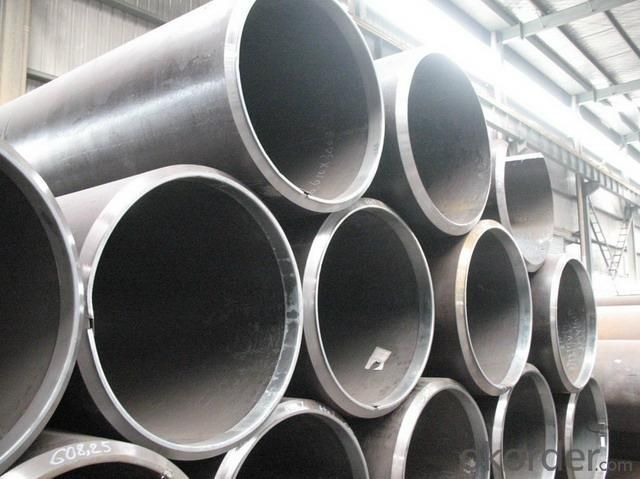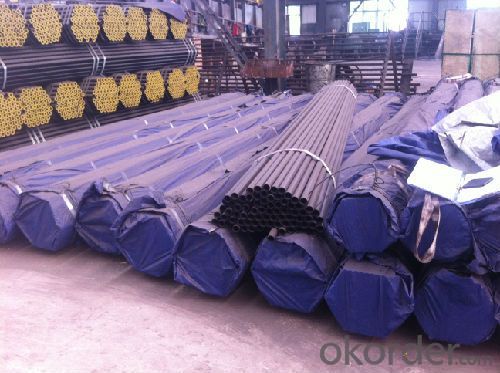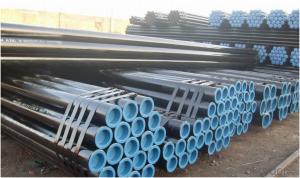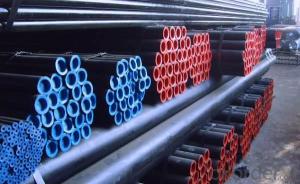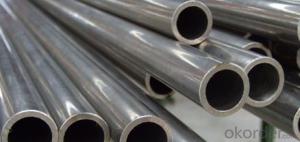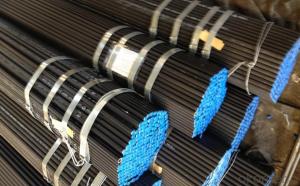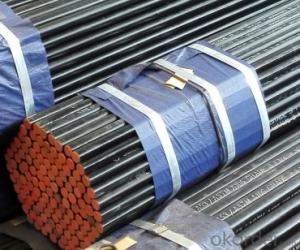Carbon Steel Seamless Pipe ASTM A106/53 API 5LGrade B With Best Price
- Loading Port:
- Tianjin
- Payment Terms:
- TT OR LC
- Min Order Qty:
- 25 m.t.
- Supply Capability:
- 500000 m.t./month
OKorder Service Pledge
OKorder Financial Service
You Might Also Like
1、Structure of Carbon Steel Seamless Pipe ASTM A106/53 API 5LGrade B:
Seamless pipe is formed by drawing a solid billet over a piercing rod to create the hollow shell. As the manufacturing process does not include any welding, seamless pipes are perceived to be stronger and more reliable. Historically seamless pipe was regarded as withstanding pressure better than other types, and was often more easily available than welded pipe.
2、Main Features of Carbon Steel Seamless Pipe ASTM A106/53 API 5LGrade B:
• High manufacturing accuracy
• High strength
• Small inertia resistance
• Strong heat dissipation ability
• Good visual effect
• Reasonable price
3、Carbon Steel Seamless Pipe ASTM A106/53 API 5LGrade B Specification:
Standard | GB, DIN, ASTM ASTM A106-2006, ASTM A53-2007 |
Grade | 10#-45#, 16Mn 10#, 20#, 45#, 16Mn |
Thickness | 8 - 33 mm |
Section Shape | Round |
Outer Diameter | 133 - 219 mm |
Place of Origin | Shandong, China (Mainland) |
Secondary Or Not | Non-secondary |
Application | Hydraulic Pipe |
Technique | Cold Drawn |
Certification | API |
Surface Treatment | factory state or painted black |
Special Pipe | API Pipe |
Alloy Or Not | Non-alloy |
Length | 5-12M |
Outer Diameter | 21.3-610mm |
Grade | 20#, 45#, Q345, API J55, API K55, API L80, API N80, API P110, A53B |
Standard | ASME, ASTM |
1) Material:20#(ASTM A 106/A53 GRB.API5LGRB,GB),45#,16Mn,10#.
2) Specification range:OD:21.3-610mm,WT:6-70mm,length:6-12m or according to the requirement of clients.
3) Excutive standards:GB,ASME API5L.ASTM A 106/A53,Despite of the above standards,we can also supply seamless steel pipe with standard of DIN,JIS,and so on,and also develop new products according to the requirements of our clients!
4) Surface:black lacquered,varnish coating or galvanized.
5) Ends:Beveled or square cut,plastic capped,painted.
6) Packing:bundles wrapped with strong steel strip,seaworthy packing.
4、Packaging & Delivery
Packaging Details: | seaworthy package,bundles wrapped with strong steel strip |
Delivery Detail: | 15-30days after received 30%TT |
5、FAQ of Carbon Steel Seamless Pipe ASTM A106/53 API 5LGrade B:
①How is the quality of your products?
Our products are manufactured strictly according to national and internaional standard, and we take a test
on every pipe before delivered out. If you want see our quality certifications and all kinds of testing report, please just ask us for it.
Guaranteed: If products’ quality don’t accord to discription as we give or the promise before you place order, we promise 100% refund.
②How about price?
Yes, we are factory and be able to give you lowest price below market one, and we have a policy that “ for saving time and absolutely honest business attitude, we quote as lowest as possible for any customer, and discount can be given according to quantity”,if you like bargain and factory price is not low enough as you think, just don’t waste your time.Please trust the quotation we would give you, it is professional one.
③Why should you chose us?
Chose happens because of quality, then price, We can give you both.Additionally, we can also offer professional products inquiry, products knowledge train(for agents), smooth goods delivery, exellent customer solution proposals.Our service formula: good quality+good price+good service=customer’s trust
SGS test is available, customer inspection before shipping is welcome, third party inspection is no problem.
6、Carbon Steel Seamless Pipe ASTM A106/53 API 5LGrade B Images:
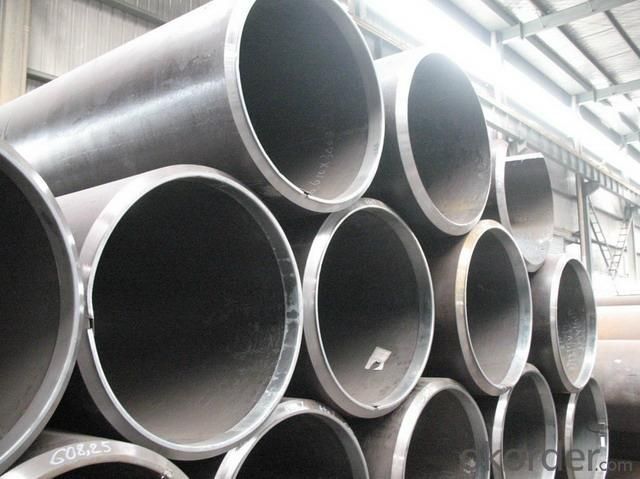
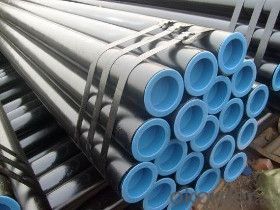
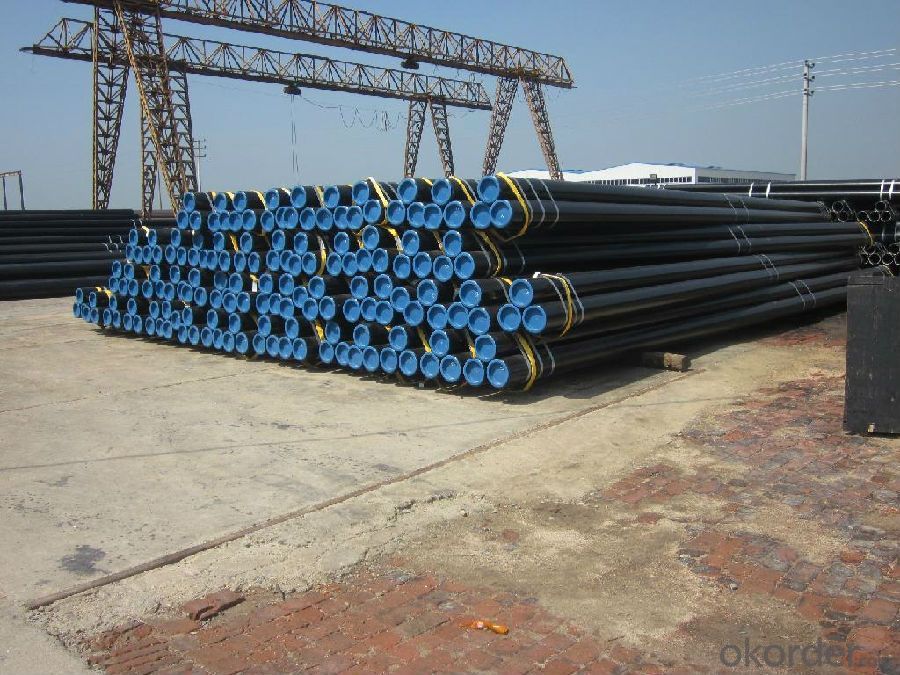
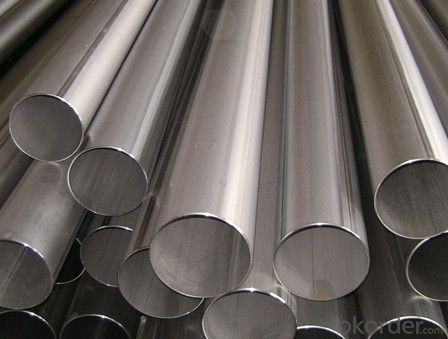
- Q: What are the different types of supports used for aboveground steel pipes?
- There are several types of supports used for aboveground steel pipes, including pipe hangers, pipe clamps, pipe shoes, and pipe saddles. These supports are designed to provide stability and prevent excessive movement or sagging of the pipes. They help distribute the weight of the pipes evenly and ensure proper alignment and support throughout their length.
- Q: Are steel pipes resistant to corrosion?
- Yes, steel pipes are resistant to corrosion due to the protective layer formed by the oxide film on their surface. However, their resistance can vary depending on the specific type of steel and the conditions they are exposed to.
- Q: How are steel pipes recycled at the end of their life cycle?
- Steel pipes are typically recycled at the end of their life cycle through a process called steel recycling. This involves collecting the used pipes, separating them from other materials, and then melting them down to be formed into new steel products. The recycling process not only helps conserve valuable resources but also reduces the need for new steel production, making it an environmentally sustainable solution.
- Q: What are the different shapes available for steel pipes?
- There are several different shapes available for steel pipes, including round, square, rectangular, and oval.
- Q: Can steel pipes be used for wastewater treatment systems?
- Yes, steel pipes can be used for wastewater treatment systems. Steel pipes are commonly used in wastewater treatment systems due to their durability, corrosion resistance, and ability to handle high pressure and flow rates. Moreover, steel pipes can be easily welded, making them suitable for various configurations and applications within the wastewater treatment process.
- Q: What is the role of steel pipes in the aerospace industry?
- Steel pipes in the aerospace industry serve various critical roles, primarily in the construction of aircraft structures and engines. They are commonly used for fuel and hydraulic systems, as well as for carrying pressurized air and gases. Steel pipes provide strength, durability, and resistance to high temperatures and pressure, ensuring the safety and reliability of aerospace components. Additionally, they contribute to fuel efficiency by reducing weight and minimizing fuel leakage.
- Q: Can steel pipes be used for aboveground applications?
- Steel pipes have the capability to be utilized in aboveground applications. Their strength, durability, and resistance to corrosion are well-known attributes, making them suitable for a variety of aboveground uses. Industries such as construction, oil and gas, water transportation, and infrastructure development often rely on steel pipes. Aboveground applications for steel pipes include structural supports, handrails, fencing, scaffolding, outdoor pipelines, and various other outdoor structures. Furthermore, steel pipes can undergo coating or painting processes to provide additional protection against weather conditions and enhance their aesthetic appearance. All in all, steel pipes offer versatility for aboveground applications due to their dependable nature and long-lasting performance.
- Q: Can steel pipes be used for natural gas processing plants?
- Yes, steel pipes can be used for natural gas processing plants. Steel pipes have excellent strength and durability, making them suitable for transporting and processing natural gas. They can withstand high-pressure conditions and are resistant to corrosion, providing a safe and reliable option for gas processing facilities.
- Q: What is a flange and how is it used in steel pipes?
- A flange is a mechanical joint used to connect two sections of steel pipes or other equipment together. It consists of a ring or plate with evenly spaced holes for bolts or welding. Flanges are used in steel pipes to provide a secure and leak-proof connection. They allow for easy assembly and disassembly of pipes, as well as provide a connection point for additional components like valves, fittings, or other pipe accessories.
- Q: What is the difference between steel pipes and concrete-lined pipes?
- The main difference between steel pipes and concrete-lined pipes lies in their composition and protective features. Steel pipes are typically made entirely of steel, providing strength and durability. On the other hand, concrete-lined pipes consist of a steel pipe coated with a layer of concrete. This lining offers additional protection against corrosion and abrasion. While steel pipes are more suitable for high-pressure applications and offer better resistance to external factors, concrete-lined pipes are commonly used in wastewater systems to prevent corrosion and extend the lifespan of the pipe.
Send your message to us
Carbon Steel Seamless Pipe ASTM A106/53 API 5LGrade B With Best Price
- Loading Port:
- Tianjin
- Payment Terms:
- TT OR LC
- Min Order Qty:
- 25 m.t.
- Supply Capability:
- 500000 m.t./month
OKorder Service Pledge
OKorder Financial Service
Similar products
Hot products
Hot Searches
Related keywords
